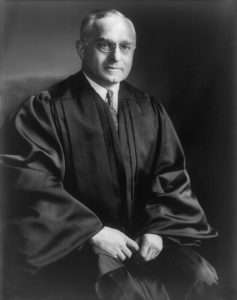The Volokh Conspiracy
Mostly law professors | Sometimes contrarian | Often libertarian | Always independent
Today in Supreme Court History: January 30, 1939
1/30/1939: Justice Felix Frankfurter takes oath.

Editor's Note: We invite comments and request that they be civil and on-topic. We do not moderate or assume any responsibility for comments, which are owned by the readers who post them. Comments do not represent the views of Reason.com or Reason Foundation. We reserve the right to delete any comment for any reason at any time. Comments may only be edited within 5 minutes of posting. Report abuses.
Please to post comments


Southern Pacific Co. v. Gallagher, 306 U.S. 167 (decided January 30, 1939): California’s Use Tax did not violate Dormant Commerce Clause because it applied only to use or storage of property in-state after interstate sale was completed
United States v. Durkee Famous Foods, 306 U.S. 68 (decided January 30, 1939): can’t bring second indictment after statute of limitations has run (first one was quashed)
H.P. Welch Co. v. New Hampshire, 306 U.S. 79 (decided January 30, 1939): New Hampshire statute prohibiting driving for hire more than 12 hours a day was not preempted by federal regulation
Mackay Radio & Telegraph Co. v. Radio Corp. of America, 306 U.S. 86 (decided January 30, 1939): directional antenna is patentable even though it merely rearranges wires in different lengths and directions in accordance with publicly known formula
Gillespie v. Oklahoma, 257 U.S. 501 (decided January 30, 1922): state can’t tax income from lease of protected Indian lands (overruled by Helvering v. Mountain Producers Corp., 1938, insofar as applied to other government-protected lands)
The H.P. Welch case involved a New Hampshire statute that prohibited drivers for a company that transported goods for hire from operating a vehicle for more than 12 continuous hours. Violation of the statute could lead to a company losing its license to do business in the state. In 1935, Congress passed the Motor Carriers Act that delegated to the Interstate Commerce Commission the power to set maximum hours for drivers, but the ICC did not actually promulgate any regulations until December 1937. The Court assumed, without deciding, that these regulations preempted the state statute.
The violations of the state statute in this case had occurred after the Motor Carrier Act became law, but before the ICC regulations were promulgated. The company argued the state statute was preempted from the date the Act became law, not from the date the regulations themselves took effect. To accept this argument, the Court noted, would lead to the absurd conclusion that an activity must remain completely unregulated once Congress has decided to regulate it, but before any regulations actually exist. So, your summary is certainly accurate as far as it goes, but I might suggest adding “before federal regulations were actually promulgated” to make it a bit more precise.
Thanks, for future reference!
Frankfurter: an underrated orator (although not always successful).
In the military, Frankfurter served under Colonel Mustard.
With relish!
He fought so well the other soldiers had to ketchup with him.
Then he was mustard out of the service. But that German he shot - that was one sour Kraut.